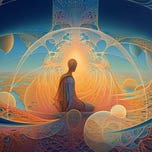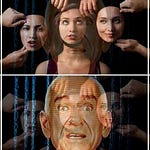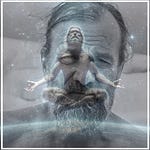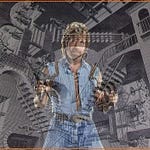Don’t be fooled. This is NOT my substack article.
Next month I will be doing a very special cross-over article on JOMO (the joy of missing out). Before that happens, however, I am starting a new July online course called Integral Theory for Idiots.
There are three relevant kinds of idiots (1) intelligent beginners who feel like they don’t know the basics of integral theory (2) people who think they already know all about but should probably think again (3) critics who think it is all a bunch of idiocy.
Sign up immediately if you are any of these three kinds of idiots.
Meanwhile, to make this more interesting than just an advertisement-update, I have included a new, very personal, audio article that transcends, includes & complicates some of Ken Wilber’s work. As you know, the audio versions are normally reserved as one of the perks for paying subscribers — but this time it is for everyone.
This bonus article is very philosophical and mystical. The course will focus on many things that are more concrete and accessible. But if you’re ready for a complex ride, read on…
“God complex??? What’s so complex about the fact that I’m God?”
(said my old friend Brad Scromeda)
I. Personal Prologue
In 2004 the integral philosopher Ken Wilber published a book of mystical instructions called The Simple Feeling of Being. It is a beautiful title. Relatable. I too am in love with a strange and wonderful feeling. An existential vibe that is the best thing that I can imagine (although, to be honest, I cannot even imagine it).
Maybe it is not even technically a feeling. I have some problems with the word “feeling.” And the word “being.” And “simple.” They are all very promising and seductive terms. Marketing terms. They make me suspicious.
I used to love words like these.
I grew up around yogis, mystics and philosophers who claimed there is an underlying blissful consciousness that is our eternal true nature. We return to it through uncontracting our hearts in relationship & establishing the supra-mental awareness of awareness itself. Ken Wilber calls it the Pure Witness or the Self Beyond the Self.
However… that could all be bullshit.
I do not mean that the experience could be bullshit. I mean that we should be open to the possibilty that we are saying it wrong. Or at least that there might be other, even opposite, ways of describing this feeling — which, I agree, is the best thing in the world. The only truly existentially satisfying condition.
But why do the philosopher-sages of today still use such old-fashioned colloquial terms like “return” and “awareness” and “true nature” and “infinite?” When you ask why these particular ideas and words are being used, the mystics will tell you that no words can capture it adequately. Then they go back to using the same old words. Consciousness. Unconditional. God. Being Itself.
I get it.
I am so impressed by this feeling, especially when it surges in intensity, that I do want to honor it with every kind of superlative title. Supreme. Timeless. Authentic. Divine. Fundamental. Yet I also want to be honest. And honestly, these kinds of words come to mind a little too quickly and seem to have their origin in the notoriously dubious evaluation systems of traditional and modern metaphysics.
The philosopher in myself cannot say with integrity that these are actually the highest words of praise for my favorite transcendental condition. For all I know, “finite” is higher praise than “infinite.” The Created could be more impressive than the Creator or the Uncreated. Maybe the most fundamental layer of Reality is the least profound?
If this “feeling” is really so wonderful and important, then maybe we should be serving it better. Exploring the phenomenology more richly. Taking bigger risks in how we interpret and evaluate it. Opening up more challenging and interesting pathways of thinking, saying and framing this very special something.
What if, for example, the very same thing that usually gets called “the simple feeling of being” would be more accurately referred to as “the complex non-feeling of becoming?”
And maybe this God or Transcendental Self or Higher Being is not even infinite? After all, infinity is pretty easy to fake. Just max out your evaluation system. A lot of things would look infinite to me just by being a bit bigger than I am or always moving faster than I can I track.
II. Complex Nondualism
Most nondualists are wildly incontinent spiritual reductionists. I call them spiritual reductionists because they think of their nondual experience as being down at the bottom of reality. In their mind, it is the realest thing because it is the oldest and most basic thing. And I call them wildly incontinent because — like a leaky bladder — they do not like to contain their thinking. It expands and gets away from them.
The most uncontracted existential condition seems to justify the most expansive possible descriptions but this is not necessary the case. As mentioned above, I do not have to submerge myself very deeply in the water before all I can see and feel is water, water, water in every direction. I could drown in a mere gallon of the stuff but I get excited and say, “It was CLEARLY an infinite ocean that exceeded all possible thought and form!”
I am delighted rather than cowed by these ambiguities, so I sometimes refer to “complex nondualism.”
It is the opposite (sic) of simple nonduality. Simple nonduality is a homogenous and reductionistic way of thinking and talking about transcendental experiences and intuitions. It says that underneath all the many forms there is a simple oneness. But in my experience, people who want to make things sound simple are often trying to manipulate you — or themselves.
So what does complex nondualism do?
Complex nondualism is very interested in undermining the duality between Nonduality & Duality. Maybe duality is the real nonduality? It is also interested in clarifying the difference between unitive (all is one) and apophatic (it is unspeakable) terminologies, on the one hand, and paradoxical (it is AND isn’t) terminology on the other hand. Plus there seem to be differences in how nonduality appears in different cultures, epochs and degrees of cognitive complexity.
Not only that, but nonduality might play a functional role in the manifest universe through concepts like adjacency, approximation and diaphaneity. (You can find out more by watching that time I was on Voices With Vervaeke with half my face shaved to “problematize dualism.” The separator is the connector.)
The feature of complex nondualism that I am highlighting in this article is the luminous ambiguity created by considering that the phenomenology of primordial existential conditions can be equally well explained by emergent or constructed conditions.
It is certainly possible to describe nondual experience by postulating an underlying, eternal Consciousness that is our true nature. Yet it is also possible to describe it as a local experience that is produced by conditional factors to create something that is different from our basic nature. And my argument is that we have not even begun to think intelligently about this situation until we have at least two plausible and contrasting theories which both honor the importance of the experience.
A QUICK NOTE ON WORD CHOICES IN THIS ARTICLE.
I am not challenging the delightful relevance of the simple feeling of being. I am challenging the assumptions we make about how it gets discussed. And before going any further, I should probably make a couple notes on terminology.
I do not find that it is possible to think of “complexity” and “simplicity” as separate alternatives. They seem, to me, like two ends of the same thermometer. Tall and short measure the same thing. And in computational processes, a simple input equation can be interchangeable with an endlessly complex output. So I prefer to say simplexity but today I will settle for complexity as a provocative alternative to simplicity.
And while I’m at it, maybe I should replace the word “being” with “becoming?” After all, we certainly do need to put change, evolution & time more centrally into our ways of thinking. Yet, can we actually think of being and becoming as opposites? Be-ing is a verb while Becoming is enough of a noun in order exist. It IS. So perhaps all we can actually think is something like various contextualized degrees of be/coming. That’s some complex nondual shit.
But I won’t trouble you today by calling this article The Simplex Feeling of Be/Coming. Let’s just keep it simple (sic).
III. The Minimum Condition for Thinking
In some lineages of esoteric practice, such as Zen Buddhism, one hears that “the mind’s essence is Buddha.” If you deeply inspect the contents and functions of your own mind, you will discover its basic nature and then realize that you were always identical to supreme consciousness. But what is that basic nature?
Many introspective people look at the gaps between thoughts and peer through them into the spacious background context of the mind. Is that the mind-essence? I tend to disagree. I think more operationally. For me, the mind-essence is comparision. A thought or a perception is a relationship. It is a discernment of simultaneous similarity & difference. So instead of releasing the activity of thinking and expanding into the background spaciousness, we could hold focus relentlessly on the is/n’t of any and every comparison.
Perhaps the essence of intelligence or awareness can be found in the root-condition of thinking but… ought we to be thinking about nonduality at all?
After all, it supersedes thinking.
Doesn’t it?
Yes and no. The experience itself is different than the thought that “this experience supercedes thinking.” When discussing these matters, we should not get trapped in the idea that “it is beyond ideas.” Any argument against philosophizing in this area is itself an example of philosophizing — so let’s stop pretending we can think about this this simply as something that cannot be thought about.
In a recent discussion with the martial artist and consciousness mystic Peter Ralston, I said, “So you mean that the explanation you give about the difference between explaining and doing… is different than doing the difference between explaining and doing?”
It was an oblique reference to that old joke:
“In theory, there is no difference between theory and practice. But in practice there is.”
Cool.
My point is that when we say that it cannot be said, we are still saying things — which can then be challenged so that we can learn to say it differently or better. Nondual experience does not need to be called “nondual experience” in order for you to do it. In fact, it could be done whilst you are calling it “dual experience.” And it is precisely by remaining open to opposite possible descriptions that we create the conditions under we can begin to actually think clearly and newly about this uniquely enticing form of experience.
It is my view that we are manifestly unintelligent until we have a plausible alternative explanation -- for anything. So what is an alternative when it comes to the so-called simple feeling of being?
IV. Primordial vs Co-Enacted
Normally a mystic considers that they can transcend or release their separative self, including mind, world, manifest forms, etc. into a singular great condition, Being or beingness, that underwrites all reality everywhere — since for always and always.
It is sought and articulated as the prior unconditional dimension of being. A latent eternal True Self to which we may “return.” This is not merely a cosmological belief but points to an actual experience that can be repeated and come to infuse all (or at least most) of our conventional experiences. In such moments, it looks self-evidently true that, underneath it all, there is something profoundly good, authentic, primal, timeless and non-separate from the core of our subjectivity.
That IS how it looks.
And there is no harm in being superficial. Looks are important. It may be useful and even desirable to fool ourselves with appearances and simplifications. But today that is not our task. Today, we should take notice of the fact that we, ourselves, are always present for these observations and conclusions about the transcendental condition.
Our sense of “what this is” does not occur in the absence of the interpreter. Yes, we sometimes seem to be extracted from all time, self & experience but we are still present to the coming-and-going of that. And what we tell other people, and ourselves, is a set of perspectival facts and contextual interpretations distinct from the phenomenology of the condition itself.
As I mentioned earlier, even the idea of “beyond context” is a context. And people who want to specify that this experience goes beyond all contexts seldom inspect their own judgements about whether or not context should be understood as a limiting factor. Perhaps context is a more expansive factor than the narrow judgement of being “context-free?” Let us remain open to possibilities of that kind.
So although it may look, every time, to me, as though a vast consciousness and bliss was present at the base of things “before I even got there,” I am nonetheless never in a position to determine whether it was always already occurring OR whether it just started as I showed up. N’est-ce pas?
Maybe I added it, or caused to begin happening, when I arrived. Just like the measurement device affects the measured object in a quantum experiment. Detecting it means changing it in physics. Could that also be true of enlightenment?
People who listen to me a lot have probably heard about my “integration surplus model.” It is the idea that enlightenment, whether as a temporary state or an ongoing stage, could be considered as the surplus numinous coherence resulting from the adequate integration of different forms of intelligence within us. Their resonant entanglement, whether caused by practice or circumstance, generates a Gestalt overflow that is more than the sum of the parts. And the result is a saturation of our entire perceptual and cognitive field with a meaningful blendedness.
Of course this would only be possible because of something deep in the logic of information systems themselves but in practice it is a way of saying that spiritual experience is local, constructed, achieved, non-fundamental.
Do I believe that?
What I believe is that we are idiots about transcendental experience until we are torn between at least two different interpretations.
V. The Achievement of Basic Being
Okay, I hear you saying, that’s fine for the human psyche. But how does it explain the basic intelligibilty and hangs-together-ness of the objective universe? Is it not the case that our experiencing emerges as an extension of the way that all systems operate? And doesn’t that mean that our experiences of a seemingly unbounded thoughtless satisfaction reflect something true about the rest of reality?
Good question. Maybe you should be writing this article? Unless, of course, by “you” I mean “me.” That’s some complex nondual shit. But in that case you would probably answer your own question by commenting that any scale or type of reality could operate specifically through this same mechanism of surplus coherence generated by adequate cooperation among the parts.
When you attempt to simply behold the is-ness of things, without any mental or reactive overlay, you may not be encountering a primordial fact but a current, ongoing, active achievement. That tree is really pulling it off right now. And when I hold my attention on the mere fact of its existence, I am perceiving the current success of its many parts doing something that is not present when they stop doing it. Or perhaps I am perceivig the current degree of success of my own brain in organizing my perception of a tree in the first place.
The point is that bare existential observation need not be thought about as revealing the underlying condition. It could be revealing precisely a current modification of the underlying condition. And this might “teach us” how to get even better at performing the same modification. By trying to hold attention on basic layers of reality we actually encouter current successful re-organizations which help us become better at organizing our many different intelligence systems into a more coordinated whole that we imagine is our underlying condition. Thus you could become enlightened through the practice of what seems to be the most basic cognition of being — without that being (sic) the case at all.
VI. But that’s What I Saw!
You know that anecdote about the philosopher Wittgenstein? He is talking to a scientist friend and he asks, “Why did ancient people think that the Sun revolved around the Earth?”
The friend says, “Because that is how it looked to them.”
“But,” replies Wittgenstein, “how would it have looked to them if the Earth revolved around the Sun?”
It is a fun story because it reveals something deep about the relationship between between perception and intepretation. We think that we “see things” and then believe the most obvious interpretation. Yet there are multiple basic ways to interpet things that occur before or within our very act of perception. And the validity of our subjective experience is not the same as believing in what we experience as the most obvious interpretation.
In multiperspectival models, such as Ken Wilber’s Integral Theory, there are spaces carved out for the validity of subjective perspectival experience. Our personal observations, encounters and transformations cannot be reduced merely to external propositional claims. First person accounts have their own kind of truth that is not just a side-effect of impersonal third person facts. There is tremendous utility and nobility in validating subjective (and intersubjective) realities.
But the distinction between Subjective and Objective truths will not help us out of our conundrum about nondual experience. Why not? Because the valid subjective experience is not the same as the immediately applied interpretation.
Just because it looked “obviously” like God, or the Void, or the Ineffable Heart of Being Itself, does not mean that this is the most accurate description of the valid thing that you actually experienced. The validity of your experience and the accuracy of what you think about your experience are different.
The whole project of Husserl’s phenomenology was to re-empower subjectivity by growing our awareness into details and complexities of personal experience that the mind ignores as soon it as gives itself an exciting and simple explanation.
Any careful explorer of high-dose psychedelic states will have noticed the odd fact that “forever” can last for a few hours. If timelessness wears off after a while then perhaps timeless was not quite the right word? This takes nothing away from the condition itself but asks us to risk stranger and more difficult ways of talking about it — just like in all the sciences.
VII. How do I know this is true?
I don’t. That’s the point.
I want the future of spiritual, developmental and existential philosophy to be more honest, daring and humble. Rather than just repeating old mystical maxims about God, Reality and the Witness Consciousness as part of our new metatheories, are there other options for naming it, thinking it, discussing it?
I am not insisting on the truth of anything in this article. Rather I am making an idiosyncratic case for treating nonduality in a more complex manner. In a manner that is available to new critical thinking because it features multiple opposed plausible interpretations that force us to compare and re-examine our immediate ideas about “what is beyond ideas.”
The Great Mystery is not that there IS definitely something mysterious that exceeds all of our knowledge. It is much more mysterious than that. The Great Mystery is that we cannot ever tell whether something mysterious exceeds our knowledge or not — no matter what we experience or feel. It is an experiential unknown Unknown.
And how does that feel?
Complex.










